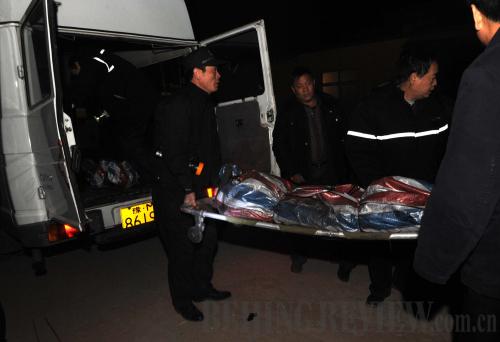|
 |
|
DISASTROUS ACCIDENT: The body of a miner killed in a gas explosion in Sanmenxia City, Henan Province, is put into a vehicle on December 8. The underground coal mine blast on December 7 killed 26 people (ZHU XIANG) |
More Medical Funding
China's State Council pledged to further upgrade the funding system for the country's medical institutions in small townships and cities on December 6.
To ensure low-income earners can afford essential medications, the government will provide additional funding to these hospitals, while improving the funding system.
Since August 2009, over half of China's medical clinics in rural townships and small urban communities have been offering essential medications at low prices thanks to ongoing healthcare reform, according to a State Council executive meeting presided over by Premier Wen Jiabao.
However, some medical institutions were short of funds because of lowered drug prices.
According to the meeting, under the new system the operational expenditure of government-run hospitals and clinics in townships or urban communities would be covered by government subsidies and medical service charges.
Cheaper Produce
China is encouraging more supermarkets to buy directly from food producers to cut out the middleman and benefit consumers, a government official said on December 4.
The government wants supermarkets to buy 30 percent, compared with the current 15 percent, of their Chinese agricultural products directly from producers during the 2011-15 period, said Chang Xiaocun, Director of the Department of Market System Development under the Ministry of Commerce.
If this target is met, supermarkets will save about 15 percent of their purchase cost. It is hoped that supermarkets would pass the savings on to benefit growers and consumers alike, Chang said.
The ministry will strengthen infrastructure construction, including the founding of large wholesale markets for agricultural products, improve trade, storage, processing facilities and the construction of frozen facilities.
Water Crisis
The expected rapid urbanization during the coming 12th Five-Year Plan (2011-15) will threaten the security of China's water resources, authorities said.
Pollution control and prevention guidelines on eight major rivers and lakes across the country for the next five years were jointly released on December 7 by the ministries of Environmental Protection, Water Resources, Agriculture and other departments.
All the plans mentioned rapid urbanization and fast economic development as posing great challenges to water protection.
The volume of pollutants in these waterways during the next five years will increase by 35 to 40 percent due to industrialization and urbanization on the Haihe River area near Beijing, according to the plan for that water system.
Inferiority Complex
More than 45 percent of Party and government officials believe they belong to the "vulnerable" segment of society, a recent survey found.
The results show the number of people who feel "inferior" is growing, despite continuous improvements to social security, which have elevated many disadvantaged groups.
The Beijing-based People's Tribune magazine polled 6,235 people belonging to various social groups. The survey found 45.1 percent of Party and government officials, 57.8 percent of white-collar workers and 55.4 percent of intellectuals felt "powerless."
In addition, 37 percent of respondents said they were "overwhelmed" by pressure, while 29 percent said unfair competition made them feel deprived.
"The mounting feelings of vulnerability come from a mentality that focuses on inequality rather than actual economic situations," Chinese Academy of Social Sciences Professor Zhu Jinchang told Xinhua News Agency. | 